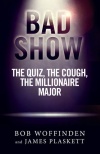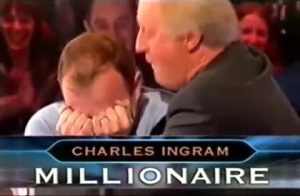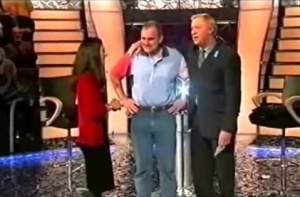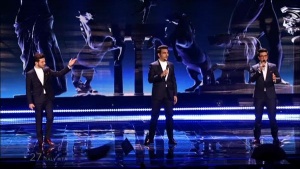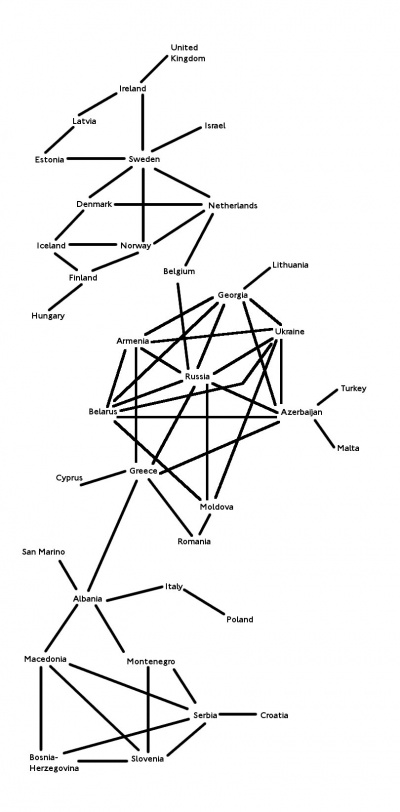Weaver's Week 2015-06-07
Last week | Weaver's Week Index | Next week
Well, the DASH puzzle hunt happened. We hope everyone had a tolerable day, and that players understand why Only Connect refuses to discuss Harry Potter. This column leaves discussion to Chris Dickson's Exit Games blog, where he has a written description and an hour-long audio feature. The latter features Mr. Bodycombe and Dr. Peake, also of this parish.
Contents |
"Bad Show" – Bob Woffinden and James Plaskett
We've been reading a book about the Who Wants to be a Millionaire trial of 2001-3. In the trial, Charles and Diana Ingram and Tecwen Whittock were convicted of fraud, because Whittock had coughed to signal answers to Charles Ingram.
The events in the case began one day before the September 2001 crimes against humanity in New York, and the verdict was given one day before the end of Sadaam Hussein's regime in Iraq. It's generally accepted that the 2003 invasion of Iraq was revenge for the attacks on New York, and stemmed from misinformation. The rulers of the era wished to believe that Iraq under Sadaam had dangerous weapons. They sought out information to back up that hunch, and ignored data that contradicted their belief. Other people can argue whether dossiers were deliberately sexed up, or whether they misled through error. Everything comes from too much weight on flimsy evidence, and the invaders could have stopped at any point.
In their book "Bad Show", Woffinden and Plaskett say that the Ingrams and Whittock were convicted from similar misinformation. Their central thesis is that the trio were stitched up by Celador and the police force. Not by malice, but by a process that built up a momentum of their own – a process that Celador could have stopped at any point.
To advance their argument, the authors drill holes in the prosecution procedure and evidence. Tapes were changed – the video of Charles Ingram's appearance was remixed to make suspicious coughs more apparent. Evidence was leaked to the tabloid press, WWTBAM producers Celador repeatedly missed deadlines to produce their evidence. Other members of the audience weren't contacted until months later, and the jury never went to the scene of the crime.
But the authors leave holes in some of their logic. When she'd appeared on WWTBAM, Diana Ingram had fallen on pop culture questions. From this fact, the authors assert that Diana has no interest in pop culture, and later that her brothers are also weak in pop culture. The book doesn't mention evidence that Whittock asked another contestant for an answer.
And there's more. Woffinden and Plaskett claim that the producers took information from preparatory chats to prepare a stack of questions for each player, tilting them to preserve people they liked and remove those they thought would make bad television. The producers stand accused of changing questions on the fly, to hinder contestants they wanted to leave. There's no evidence to back up this claim, the authors admit there's no evidence to back up this claim. We are told that it was a general assumption, so it affected contestants' behaviour. The crucial questions, never addressed, are whether the contestants' perception was accurate, or if the contestants' actions changed what Celador did.
The authors make many valid points. They're strong on the nature of adversarial criminal trials, the risk of trial by media, whether it's possible to keep a jury free from prior knowledge on such a high-profile case. We had forgotten that WWTBAM was policed by its own producers, and agree that independent adjudicators are a welcome addition to any programme. We agree that ITV's documentary "Major Fraud" set out the case for the prosecution, and kicked people when they were down.
But the authors chase after their hobby-horses. The evils of the tabloid press recur on many pages. So does another syndicate rigging the show in its favour. It begs the question, "if *he* was doing this, what's to say the Ingrams and Whittock weren't, but better?"
There's a regular question, "was this a good use of taxpayers' money?". It brings to mind the anti-social rantings of The Taxpayers Alliance Ltd. The authors conflate "fairness" and "justice" in an unhelpful manner. They never explore the contents of Diana Ingram's conversations with Tecwen Whittock, and meekly accept her claim that she was testing pagers on the night before Charles's second appearance.
From our view, the case rested on Whittock's defence, that he was susceptible to coughing, particularly in hot and dusty places. For instance, a television studio. Our view from the contemporary press reports was that the prosecution case required rebuttal. It was for the jury – they'd been in court, we hadn't – to determine whether the defence could convince them of a reasonable doubt.
The authors have produced a readable book. It sets out the case for the defence clearly and precisely. They make a strong argument that the process behind the trial was unjust, that some participants were privileged over others. It doesn't change our view that the conviction is fair, that it can be sustained on the evidence presented to the jury.
And here's why we're hedging: Woffinden and Plaskett introduce new claims that it's possible to identify coughers through a cough-signature, and that there were two sources of cough in the seats behind Ingram. This evidence hasn't been presented to court. If this claim can be verified and validated, it strongly points to the innocence of all involved.
Eurovision Song Contest
The voting and other fallout
Simon Cowell said that he wanted to be involved with the UK's entry. Mr. Cowell's expertise is in the Anglosphere. We saw in World Idol that he's not able to comment with knowledge on diverse musical cultures. On the other hand, he does know things that are popular.
A few slightly cheeky alternative histories. Under the 1969 system (each juror awards one point to their personal favourite, the televote winner gets 5 points), there would be some changes. Moldova, Ireland, and Portugal make the final, replacing Greece, Cyprus, and Azerbaijan. Italy win the overall contest, as they do under an Alternative Vote system.
With ten to qualify from each semi-final, systems of Single Transferable Voting can be used on the jury and televote rankings. Moldova may replace Albania, and Malta could have taken Cyprus's place. The same STV tells us that Germany finished stock last, with the UK in 26th place again.
The Saturday winner would not change if the televote counted twice, or even three times as much as the jury rankings. It's clear that Il Volo's performance on Friday cost them greatly, and they only recovered part of the ground on Saturday.
There are more grounds to say that the RAI entry may have been the second most-popular. If jury and televote rankings below position 10 are compressed, or under the scoring system used until 2012, Il Volo move ahead of Polina Gagarina.
And to the annual New Map of Europe, or London to Zagreb in ten capitals or less. The continent is divided into three main groups, with single links:
- The Scandinavian Cross, centred around Sweden, Denmark, Norway, and the Netherlands. One arm covers Iceland, Finland, and Hungary. Another has Estonia, Latvia, Ireland, and the UK. Israel is attached to Sweden, and the Netherlands link to Belgium.
- The Intervision Intervoting. Belgium also links to Russia. And Russia swaps votes with Armenia, Ukraine, Belarus, Georgia, Azerbaijan, Greece, and Moldova. Most of these countries swap votes with each other, too. Hanging off this group are Lithuania (linked to Georgia), Turkey and Malta (links to Azerbaijan), and Cyprus (linked to Greece).
- The Balkan Block. Greece links to Albania, which in turn heads off to the former Yugoslav republics, which mostly vote for each other. Albania also has links to San Marino and Italy, while Italy is in an arrangement with Poland.
So the path from London to Zagreb goes through Riverdance, ABBA, the Common Linnets, Loïc, the twins, free alcohol, the Festivali i Kenges, No Name, and Molitva.
As ever, we've a picture to explain it a bit better.
This Week and Next
We are shocked to report that Charles Kennedy died this week. He'll be remembered primarily as leader of the Liberal Democrat political party for six years, and as a fan of Gonzo the Great, and as a thoroughly pleasant person. We also remember his contribution to the shows we call game. "Chatshow Charlie" played Who Wants to be a Millionaire in 2006, beat Edwina Currie at Celebrity Countdown, did Masterchef and The Music Game and Cluedo.
He may be remembered for his Christmas party trick in 2002. While other politicians might tell a long and unfunny joke, or run away quickly from that joke, Charles Kennedy connected with an audience of five million when he hosted Have I Got News for You. Here's the video.
Britain's Got Talent finished last weekend. Champion Jules O'Dwyer came in for some bad publicity when it emerged that her winning routine featured three dogs, and not the two viewers thought they saw.
Ms O'Dwyer won with a routine involving a tightrope and stolen sausages. She told the Lorraine show that another border collie walked the parallel ropes in their act, because the named star is not keen on heights.
This difference had to be known to the producers. If anyone is to be criticised, it's the producers and ITV, for not being completely honest with the public. Do we care that Chase subbed in for Matisse? Not really. Do we care for honest programme-making? We do, and we were pleased to see Peter Fincham apologise on behalf of ITV.
BARB ratings in the week to 24 May.
- The Eastenders topped on a low score, 7.65m. Saturday's audience was split: Britain's Got Talent had 7.35m, and an average of 6.8m saw the Eurovision Song Contest across its 238-hour run.
- HIGNFY had 4.85m, Ninja Warrior 3.6m, and Catsdown 1.45m.
- Daytime watch: Pointless 3.55m, Tipping Point 1.7m, Eggheads 1.1m, Beat the Brain 920,000, Come Dine with Me 860,000.
- Big Brother is getting just 1.35m for its shows. It's less popular than Tipping Point, but still beats Celebrity Juice (1.12m).
- 850,000 for Eurovision on BBC3, 260,000 for sing-a-long-a-Eurovision on the Red Button, and Big Brother repeats on MTV are seen by 5000 people.
Double or quits on low-rent reality show, as Celebrity Love Island returns (ITV2, from Sunday). There's a new run of Counterpoint (Radio 4, Monday), the Countdown final (C4, Friday), and Mock the Week is back (BBC2, Thursday). Saturday night's right for Prized Apart (BBC1).
Photo credits: Celador, ÖRF / EBU, SyCo / ITV.
To have Weaver's Week emailed to you on publication day, receive our exclusive TV roundup of the game shows in the week ahead, and chat to other ukgameshows.com readers, sign up to our Yahoo! Group.

